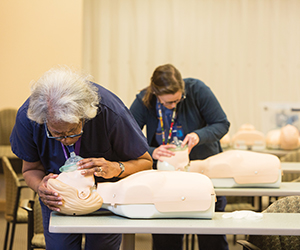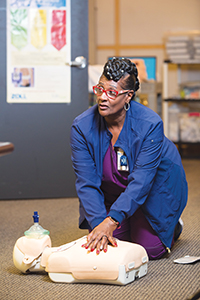By DALE SINGER
Tanya Johnson, an emergency room nurse at the UC Davis Medical Center in California, was on duty in the summer of 2017 when her cell phone started to vibrate in a way she had never felt before.
She looked at the phone and saw a photo of a giant heart and a message that someone in a nonclinical area of her building needed cardiopulmonary resuscitation. She rushed to the location and started chest compressions on a woman who had collapsed to the floor. Johnson got the woman's heart pumping before an emergency response crew arrived on scene.

Ernestine Davis, foreground, a unit secretary, and Cara Fink, a sonographer at SSM Health St. Anthony Hospital, learn basic life support in a staff training held in late January at the Oklahoma City facility. SSM Health is asking its CPR-trained staff in and around Oklahoma City to register on the PulsePoint website to receive emergency notifications via an app when someone in near proximity is in a cardiac crisis. © SSM Health
"Everybody was like, 'How did you know to come here?'" Johnson recalled. "I said, 'My phone told me.'"
Or, more precisely, the PulsePoint app notified her. The app is the product of PulsePoint, a San Francisco nonprofit. The PulsePoint app is designed to reduce the time between cardiac arrest and an attempt at resuscitation. Time is critical to reduce disability or prevent death.
The app has been downloaded more than 1.2 million times in the eight years it's been available. It is used by ordinary citizens with CPR training and health professionals in more than 3,350 communities around the country. Oklahoma City, where the cardiac emergency response app is being sponsored by SSM Health, joined that expanding list last month.
"Not only is the technology ultracool, it represents the best in how you create partnerships to benefit a community," says Dr. Kevin L. Lewis, president and chief executive of the SSM Health Medical Group in Oklahoma City.
SSM Health has started the rollout with a soft launch in Oklahoma, asking its CPR-trained staff to register on the PulsePoint website to receive emergency notifications via the app when someone nearby is in a cardiac crisis.
Lewis said the next step is for emergency service agencies in and around Oklahoma City and Tulsa to become familiar with the app. The Emergency Medical Services Authority, which delivers prehospital emergency health care in the region, is handling the technical end of tying the region's computer-aided dispatch system to the instant app alerts.

Annette Hill practices chest compressions during a staff training in basic life support skills at SSM Health St. Anthony Hospital. She is a clinic representative in oncology at the Oklahoma City hospital.
© SSM Health
After that, SSM Health will encourage all health care providers in the region with CPR training to sign up on the app. The final step is to offer the free app to anyone in the area who is trained in CPR. Most CPR classes now include training in the use of an automatic external defibrillator to restart a heart that has stopped beating.
"If all we could do is get every (CPR-trained) health care employee from major organizations in this area to sign up, we would have several thousand individuals who are ready, willing and able to take part" in an emergency response, Lewis said.
"We'll keep a really close eye on how many people have downloaded in our area and a very, very close eye on how many events over a period of time are alerted," he said.
Promoting use of the app to community members opens an added opportunity to broaden awareness of cardiac risk and ways to prevent heart disease, which is the number one killer in Oklahoma, Lewis said.
The app works like this: When someone calls 911 to report a sudden cardiac arrest, citizen responders will get an alert that CPR is needed in public locations near them moments after professional emergency responders are dispatched to the scene. A citizen responder may be much closer than the EMS personnel who are en route.
In addition to letting a CPR-trained person know where help is needed, the app also displays a map showing the location of the nearest defibrillator. PulsePoint has the locations of about 74,000 defibrillators in the U.S. in its database.
Some costs for the app are covered by the PulsePoint. Fire/EMS agencies are the entities who most typically sponsor the app. Sponsors pay a one-time $10,000 implementation fee. There is an annual license fee ranging from $8,000 to $28,000, depending on the population of the service area.
A spokeswoman for PulsePoint said that nationally, as of mid-January, the app had been activated more than 62,000 times, with more than 201,000 nearby responders having been alerted to an emergency.
Brock Jenkins of Columbus, Ohio, downloaded the app when he was training to be a paramedic, and he said it helped him save the life of someone who was eating in an Italian restaurant that he and his fiancée had just left.
"The guy was completely unresponsive, lying down," Jenkins recalled. "His family was around, just holding his head. He didn't have a pulse, and he had the kind of respiration you have when you're dying."
In the four minutes before paramedics arrived, Jenkins started chest compressions, just as he had been trained to do. "It was just like muscle memory going through at that point," he said.
Paramedics successfully used a defibrillator, and the man regained consciousness. By the time they delivered the patient to the hospital, he was up and talking, Jenkins said.
"If I wasn't there, I hope he would have had a good outcome," he said. "People were praying for him, but I don't think that would have been enough for him at that point."
Johnson said her experience in California has made her a PulsePoint evangelist.
"I've been spreading the word — OK everybody, get out your phones and download the app. It's awesome," she said.